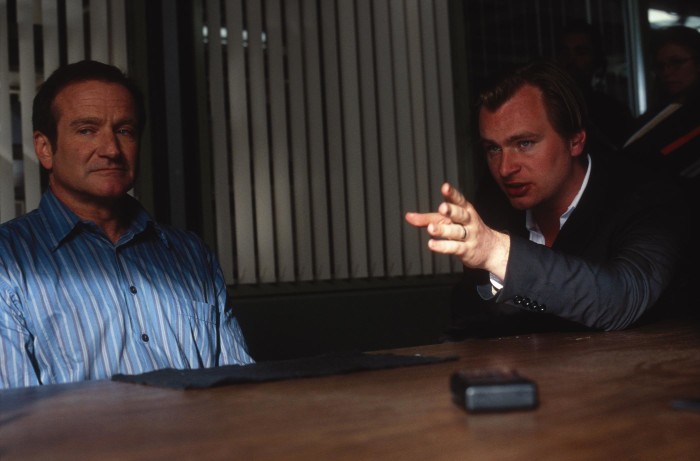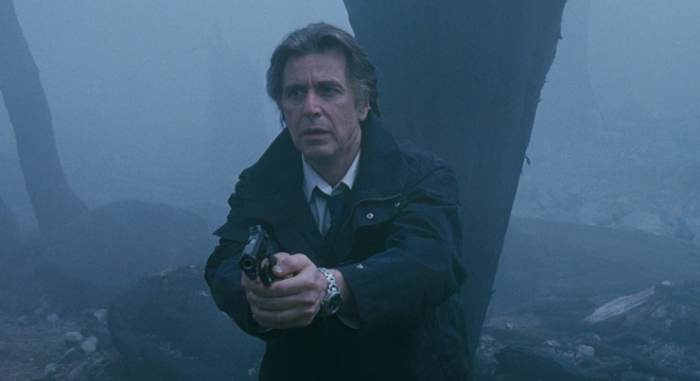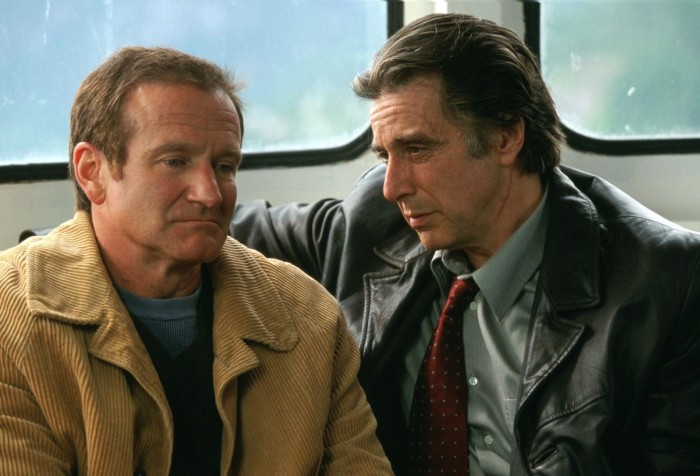Revisiting 'Insomnia,' Christopher Nolan's Most Underrated And Forgotten Film
When we think of director/writer/producer Christopher Nolan and the hallmarks that line any of his films, a few obvious things come to mind. Twisty, complex stories. Taciturn and dour (to the point of humorless) lead characters. Jaw-dropping effects, both practical and computer-generated. Massive action setpieces. There's little doubt that Nolan's latest film, Dunkirk, will have a few of these hallmarks present, specifically in regards to special effects and action sequences. Yet even though it's a straightforward narrative about the infamous Battle of Dunkirk in World War II, Nolan has said the film will be told in three timelines, from the air, land, and sea fronts.
Largely, you have to go back 15 years to find his sole film without tons of the familiar elements that define what we think of as a "Christopher Nolan film." That film is Insomnia, which remains Nolan's most underrated film, all the more so because it's so assured, intense, and remarkable.
Maybe it's because Insomnia feels so unlike the rest of Christopher Nolan's filmography on the surface that it's so easily forgotten, if not willfully ignored. Unlike even Dunkirk, this movie (a remake of a 1997 Norwegian film) really has only one kinda/sorta plot twist, and it only hits if you avoided any of the movie's marketing campaign in the early months of 2002. The plot is straight out of an old-school potboiler: two Los Angeles detectives, Will Dormer and Hap Eckhart (Al Pacino and Martin Donovan), travel to the small town of Nightmute, Alaska by request of Dormer's old colleague who's now the sheriff of the fishing town. Dormer and Eckhart have been tasked with aiding in an investigation into a brutal murder of a female teenager. At the same time, Dormer is feeling the heat from the Los Angeles division of Internal Affairs, whose investigation into his questionable ethical choices in past cases is being aided by Eckhart himself. Soon, Dormer and Eckhart are chasing a murder suspect through the thick Alaskan fog, until Dormer shoots someone he presumes is said suspect; instead, he's accidentally shot and killed Eckhart.
The unreliable-narrator element that so defined Nolan's first big hit in the United States, Memento, is present (if more subtly) in Insomnia. Did Dormer not realize that he was shooting at his partner, a man who might bring him down once they return to the mainland? Did he see a chance to eliminate a thorn in his side? The questions are raised more directly once Dormer learns that the suspect he was chasing, Walter Finch, not only is the murderer he's trying to find, but saw Dormer kill his partner.
In 2002, at least, the bigger surprise was less that Finch saw Dormer's crime, but that Finch was played by iconic and outsized stand-up comedian and actor Robin Williams. As mentioned above, the ads for Insomnia didn't quite go to the lengths of a similar crime thriller like Se7en and hide the reveal of the well-known actor playing its killer. (In those trailers, Williams shows up about 80 seconds in, at least suggesting that he wouldn't be in the whole film.) In the years leading up to Insomnia, Williams was largely seen as a family-friendly movie star, appearing in films like Mrs. Doubtfire, Jumanji, Patch Adams, and more. Even his more successful adult fare, such as his Oscar-winning turn in Good Will Hunting or the Terry Gilliam film The Fisher King, suggested a familiar enough version of Williams as the perpetually upbeat, goofy, and sometimes manic face of 1990s-era comedy.
Partially because of serendipitous timing, 2002 was a banner year for Williams, in which he successfully managed to subvert his cheerful, wild-man persona with three very different, very dark films: the Danny DeVito-directed showbiz satire Death to Smoochy, Mark Romanek's moody indie film One Hour Photo, and Nolan's Insomnia. Of these, Death to Smoochy is arguably the weakest, though even a messy, adult parody of children's TV shows like Barney and Friends is worth watching. (Williams, as the unhinged "Rainbow" Randolph Smiley, is playing a suitably delirious character in ways that are more familiar to his earlier work.) One Hour Photo, which was shown first at the Sundance Film Festival, features Williams playing just as disturbingly against type as he does in Insomnia, the difference being that Romanek's film focuses squarely on his character instead of making him a key supporting player.
Insomnia was released to wide audiences a couple months after Death to Smoochy flopped in March of 2002, and a couple months before One Hour Photo performed decently. Insomnia received solid critical praise and decent box office, making it really the first time people had seen Robin Williams in such a dark and devious role. With 15 years of hindsight, it's not at all surprising that Williams could so easily slip into the guise of Walter Finch, a normal-seeming middle-aged man who's known for his crime novels that belie his dark interior. A good chunk of Williams' screen time is devoted to Finch calling Dormer at his hotel and calmly, methodically taunting the detective, who's suffering from sleep deprivation in a town where it's perpetually light outside. But even when Williams is onscreen, he cuts a simultaneously grim and pathetic figure, barely willing to defend himself physically against an LA detective yet able to push his mental buttons.
Among other things, Insomnia is underrated because it features, to date, the last great performance from one of modern cinema's finest actors, Al Pacino. (Two close runners-up would be his portrayal of Roy Cohn in HBO's adaptation of Angels in America as well as his villainous turn in Steven Soderbergh's Ocean's Thirteen.) In the last 25 years or so, it's become easy to presume that we know what a Pacino performance will entail: primarily, over-the-top emotional outbursts in the style of his "Hoo-ah!" moment from Scent of a Woman. Dormer is the polar opposite of this kind of Pacino character: even as he's being attacked on all sides, he's quiet and muted, as faded as his suit jacket. Dormer, as the title and his surname would suggest, looks and feels exhausted from the first seconds of the film, and Pacino doesn't avoid emphasizing that sense of weariness. In part because Pacino's playing a character so far afield from his larger-than-life work in the past (even his work in Michael Mann's incredible Heat is wild and unpredictable), he's almost revelatory as the intense but introverted Dormer.
IMAGE
These days, for good or ill, Christopher Nolan's films are championed by some less for featuring great performances than for technical wizardry in service of grand ideas. (Even his weakest blockbuster, The Dark Knight Rises, has some fine acting, including from Anne Hathaway as Catwoman, a couple years before she would deliver another solid performance in Interstellar.) Insomnia is thus notable because its technical quality is more grounded, literally and figuratively, and features no large-scale ideas a la the dream world in Inception or space travel in Interstellar. The script, written by Hillary Seitz, is more in line with the internal machinations of men who try to be and do good but are lured to darker ends a la Memento than almost anything else Nolan has done, perhaps excepting his brilliant adaptation of The Prestige. (Though that film is very much about technical wizardry in service of grand ideas.)
One of the most remarkable things about Insomnia is the notion that if Christopher Nolan were a relative neophyte among directors in 2017, having directed only one critical favorite before, he wouldn't even have to make this. Though Memento wasn't Nolan's first feature directing effort (that would be the 1998 film Following), it was his calling card that played at festivals and gained him praise from Oscar-winning multihyphenate filmmaker Steven Soderbergh. After that, Nolan directed Insomnia (notably, Soderbergh is an executive producer on the film); only after the film was moderately successful, offered as summer counterprogramming and grossing $113 million worldwide, did he get a chance to leap into big-budget blockbusters with Batman Begins. In 2017, studios take less time to put younger directors into the big game: Colin Trevorrow got Jurassic World after Safety Not Guaranteed; Jon Watts got Spider-Man: Homecoming after Cop Car; and so on. Insomnia is not the kind of movie that big studios make anymore, or so it seems; it's not even the kind of movie that would be used as testing to make sure a filmmaker has the chops for bigger things.
That's a shame, unquestionably. Insomnia is not Christopher Nolan's best film (it's a two-way battle between Memento and The Dark Knight), but it does deserve a great deal more attention than it currently receives. At the time, it starred three Oscar-winning actors (Hilary Swank plays a local cop who idolizes Dormer but slowly realizes her hero may have skeletons in his closet) who were at the peak of their talents. Pacino hasn't been better since, and outside of the very dark World's Greatest Dad, Williams' work in 2002 remains a true banner year that he never topped. Insomnia may not be the most complicated or grand-scale film of Christopher Nolan's career, but its unique status among his filmography, and among studio releases, is one of many reasons that people should give it a second (or first) shot.


